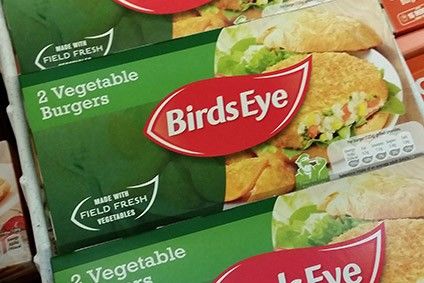
Nomad Foods CEO Stéfan Descheemaeker today (25 August) insisted the UK-based frozen food group was seeing its sales trends improve despite the Birds Eye reporting a fall in underlying first-half revenue and earnings.
Looking at the adjusted numbers for the US-listed business, which excluded factors such as exceptional items, share-based payment charges and the impact of forex gains or costs, profit for the six months to the end of June stood at EUR88.4m (US$99.7m), down from EUR89.8m in the first half of 2015. Adjusted EBITDA dipped 0.4% to EUR177.7m.

Discover B2B Marketing That Performs
Combine business intelligence and editorial excellence to reach engaged professionals across 36 leading media platforms.
The figures for the first half of 2016 were compared to “pro forma as adjusted” numbers for the first six months of 2015, which includes the results of the Iglo Group from 1 June 2015, the reported results of the Iglo Group for the five months ended 31 May 2015 and the “consolidated carve-out” results of the Findus Group for the six months to 30 June last year.
Nomad Foods did not have any operations before 1 June last year when its deal to buy Iglo Group was finalised. Nomad Foods then bought the bulk of Findus’s operations later that summer.
Gross profit slid 6.1% to EUR307.1m on the back of a fall in sales volumes. Nomad Foods’ gross margin decreasing by 0.3 percentage points to 30.6% due to “an adverse mix” and the “dilutive impact” of the acquisition of Nestle’s Spanish frozen ready meals business, La Cocinera, by the then independent Findus Group in January 2015.
Revenue fell 5.3% to EUR1bn. Stripping out an EUR18.1m impact of exchange rates on Nomad Foods’ top line, the company’s exit from Russia, an additional trading day in the first quarter of 2016 and the price of the La Cocinera deal, the group said its revenue fell 5% on a like-for-like basis in the first half of 2016.

US Tariffs are shifting - will you react or anticipate?
Don’t let policy changes catch you off guard. Stay proactive with real-time data and expert analysis.
By GlobalDataNomad Foods said the decline in sales was “driven” by its three largest markets – the UK, Italy and Germany. However, it said each of these markets saw the rate of decline fall year-on-year compared to the second half of 2015.
In the second quarter of this year, Nomad Foods’ like-for-like revenue dropped 3.8%. However, the company said that was an improvement on the 6.1% year-on-year decline it had seen in the first three months of the 2016.
“We managed to successfully slow the rate of sales decline for the third successive quarter amidst challenging market conditions and have now halved the rate of decline since the trough in the three months ended September 30, 2015,” Descheemaeker said. “We have maintained margins and cash generation consistent with our internal outlook. As we continue to implement our strategy and our actions start to reach the marketplace through the balance of the year, I am encouraged by our progressive quarterly improvement to the top-line trend.”
On a reported basis, Nomad Foods posted a EUR34.9m profit after tax, which includes exceptional items of EUR78.2m. In the first half of 2015, the company generated a loss after tax of EUR541m, primarily resulting from exceptional non-cash charges related to the annual dividend to the company’s founders.
Nomad Foods was set up two years ago by businessmen Martin Franklin and Noam Gottesman as a vehicle to make acquisitions and its first two deals have been in Europe’s frozen food sector – snapping up Iglo and Findus.





